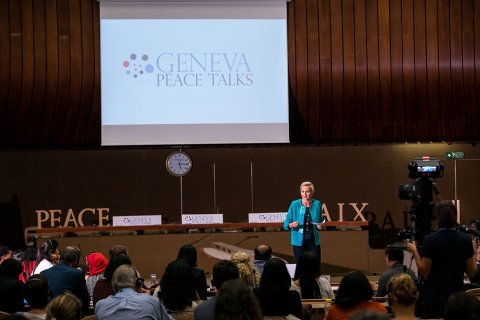Trust as a basic component in (cultural) diplomacy
… and how cultural diplomacy can be a tool for trust building
October 04th, 2019At the Geneva Peace Talks on September 19th, a public event co-organized by the United Nations Office in Geneva, Interpeace and the Geneva Peacebuilding Platform, the main theme was trust and trust building. They discussed the topics through a series of 8-minute talks, where speakers shared their personal stories and experiences.
Trust is ever so important in the digital era that we are currently experiencing, with the rise in power of social media platforms and fake news. The world is experiencing ongoing instability with major conflicts; Brexit, external influence in national elections and an uncertainty in the future US-Nato relation. In a globalized and intertwined world – where threats are more and more transboundary – cultural diplomacy can be a tool for development. Furthermore, cultural diplomacy can play an important role in building trust within the international community.
The rise of populist politicians as foreign policy leaders poses challenges to the international community when it comes to trust. According to an article in The Guardian, populists are now using lies frequently, and seemingly shamelessly. Most of these lies are meant to be seen and the purpose is to create doubt among people and people’s opinion. If we, through cultural understanding, can come closer to each other, it will be more difficult for these lies to grow and we can then undermine the power of populists who use lies as a tool. One of the speakers at the UN event, Antje Herrberg, described diplomacy as “continuous trust building”, which highlights how trust is a dynamic process.
One situation where this is evident is the peace and reconciliation processes in conflict-ridden areas. Coronel Lurangeli Franco, another speaker who is a member of the National Police of Colombia in the Unit for Peacebuilding stressed that trust building was a key factor in the implementation of the peace accords. Building trust among the different parties involved in the territories was, according to her, the only way to give the process legitimacy. Through listening to other people’s stories and experiences, the unit could work more efficiently as they had learned about the environment they were working in. This shows how trust can be a key to go beyond an agreement and initiate a process of growth for the future.
Putting cultural diplomacy into practice can be challenging as the definition is both broad and narrow. One definition suggests that it can be explained as a course of actions that aim to exchange ideas, values, traditions and other aspects of culture to strengthen cooperation. The examples from the speakers put forth here, show how cultural diplomacy can be implemented.
Trust is vital when it comes to facing one of the greatest threats of our time; climate change. In order to face this threat, we will need each other. A stable cooperation is a prerequisite when we move to act on what is decided in agreements. To be truly successful, there is a need for trust – in the mission, the actions and in each other. Cultural diplomacy can be used as a tool to achieve this and it will be ever so important for future development. We must not forget or neglect the cultural turn of diplomacy – it is a resource that, if used right, can lead us forward. Communication can be more efficient if we consider and understand the cultural aspects of the desired audience. In a time of uncertainty and mistrust, maybe the practice of cultural diplomacy through dialogue has the potential to break down the walls hindering us.





